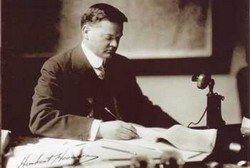Accomplishments Of Herbert Hoover
|
| updated |
Copy Link Code
|
 The major accomplishment of Herbert Hoover centered on his humanitarianism, a fundamental concern for the welfare of people. Hoover was a man of moral courage and compassion. During and after the First World War, Hoover supervised and organized food relief efforts in the countries abroad that were left devastated by the war. Hoover also accomplished the feat of helping thousands of Americans to return to the United States after the war had ended. As Secretary of Commerce following World War II, Hoover again administered food relief, and he oversaw federal disaster relief in ten states that resulted from the devastating flood of the Mississippi River in 1927.
The major accomplishment of Herbert Hoover centered on his humanitarianism, a fundamental concern for the welfare of people. Hoover was a man of moral courage and compassion. During and after the First World War, Hoover supervised and organized food relief efforts in the countries abroad that were left devastated by the war. Hoover also accomplished the feat of helping thousands of Americans to return to the United States after the war had ended. As Secretary of Commerce following World War II, Hoover again administered food relief, and he oversaw federal disaster relief in ten states that resulted from the devastating flood of the Mississippi River in 1927.
Herbert Hoover's accomplishments also include increasing the federal budget to include children's programs; he also hosted the first ever White House Conference on Child Health and Protection. After leaving the Presidency, Herbert Hoover became Chairman of the Boys' Clubs of America in 1936 and remained in that position for twenty-five years.
Herbert Hoover also had many achievements based on his humanitarian traits, goals that he set for himself. Hoover achieved unprecedented prison reform, spending $7 million on building a new prison and increasing the rights and humane treatment of prisoners, based on his Quaker beliefs. This effort led to eight bills passing Congress which eliminated prison overcrowding and the establishment of work camps, as well as moving the prison employees to the supervision of the Civil Service Administration. Educational and health benefits for prison employees were improved and prison employees became better trained through a special school. The number of parolees doubled while Hoover was president.
Another Hoover achievement was increasing the amount of land in the National Parks System. He also cancelled private oil leases that were active on government lands. One of his greatest personal achievements was the creation of the Children's Charter promoting protection regardless of gender or race, which he wrote himself. He also withdrew U.S. troops from Haiti and Nicaragua which would eventually lead to FDR's Good Neighbor Policy. Further, Hoover's achievements included doubling the amount of Veteran's Hospitals and reducing the size of America's Navy by one-third.
Herbert Hoover increased the federal appropriation for Howard University and appointed blacks to positions of authority in government agencies, including to those implementing federal paroles for prisoners. He advocated for tenant farmers and sharecroppers to be able to purchase the land they farmed. Hoover also advocated for better conditions for Native Americans, which led to better schools and educational opportunities, better living conditions and a more visible presence, through his Quaker appointees, in governmental affairs.
Two of Hoover's most notable achievements were:
- The Agricultural Marketing Act, a $500 million revolving fund used to purchase surplus goods from farmers that would be resold when the economy improved.
- In 1949, Hoover co-founded UNICEF, the United Nations Children's Fund, a global advocate for all children's health, welfare and rights. Hoover also convinced the states bordering the Colorado River to collectively harness electrical energy; the result was the building of Hoover Dam, which became a legacy for Hoover's energy policies. He also negotiated with Canada to develop the Saint Lawrence waterway, and he was instrumental in building the San Francisco Bay Bridge and the Los Angeles Aqueduct system
